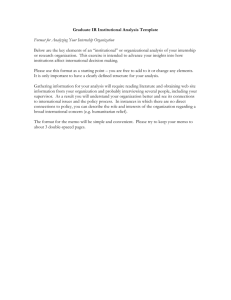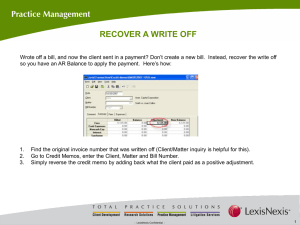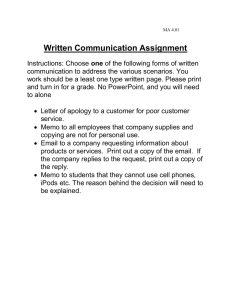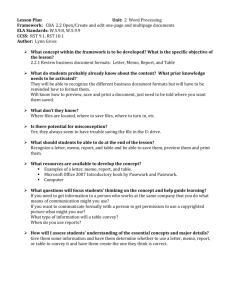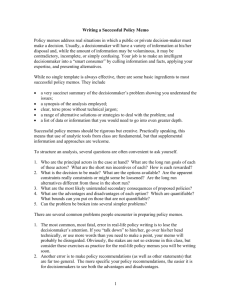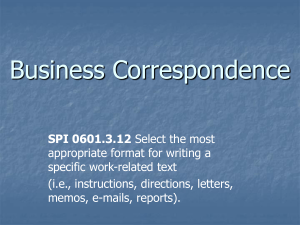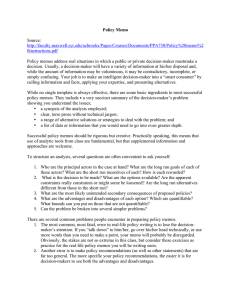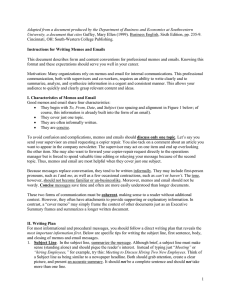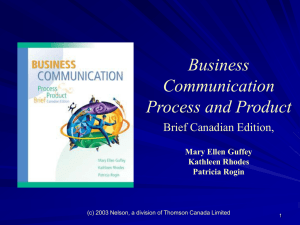Syllabus
advertisement
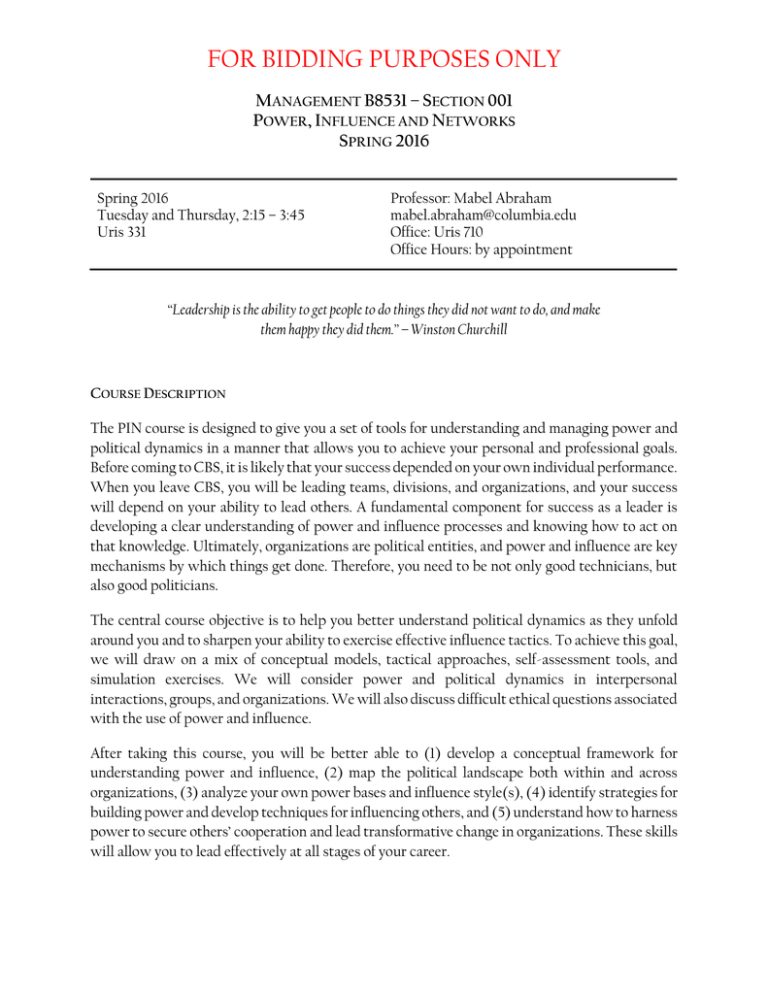
FOR BIDDING PURPOSES ONLY MANAGEMENT B8531 – SECTION 001 POWER, INFLUENCE AND NETWORKS SPRING 2016 Spring 2016 Tuesday and Thursday, 2:15 – 3:45 Uris 331 Professor: Mabel Abraham mabel.abraham@columbia.edu Office: Uris 710 Office Hours: by appointment “Leadership is the ability to get people to do things they did not want to do, and make them happy they did them.” – Winston Churchill COURSE DESCRIPTION The PIN course is designed to give you a set of tools for understanding and managing power and political dynamics in a manner that allows you to achieve your personal and professional goals. Before coming to CBS, it is likely that your success depended on your own individual performance. When you leave CBS, you will be leading teams, divisions, and organizations, and your success will depend on your ability to lead others. A fundamental component for success as a leader is developing a clear understanding of power and influence processes and knowing how to act on that knowledge. Ultimately, organizations are political entities, and power and influence are key mechanisms by which things get done. Therefore, you need to be not only good technicians, but also good politicians. The central course objective is to help you better understand political dynamics as they unfold around you and to sharpen your ability to exercise effective influence tactics. To achieve this goal, we will draw on a mix of conceptual models, tactical approaches, self-assessment tools, and simulation exercises. We will consider power and political dynamics in interpersonal interactions, groups, and organizations. We will also discuss difficult ethical questions associated with the use of power and influence. After taking this course, you will be better able to (1) develop a conceptual framework for understanding power and influence, (2) map the political landscape both within and across organizations, (3) analyze your own power bases and influence style(s), (4) identify strategies for building power and develop techniques for influencing others, and (5) understand how to harness power to secure others’ cooperation and lead transformative change in organizations. These skills will allow you to lead effectively at all stages of your career. FOR BIDDING PURPOSES ONLY COURSE REQUIREMENTS AND GRADING You will be evaluated on three types of work throughout the semester: (a) class participation (30%); (b) memos (30%); and (c) a final paper (40%). Class Participation (30%): Hearing the ideas, experiences, and insights of your classmates through an interactive class discussion is an essential component for understanding the concepts introduced in this course. It is therefore essential that you are committed to attending all classes fully prepared and that you participate actively in class discussions. Your participation grade is based on your presence in class and your contributions to the class discussion. You will have opportunities to make contributions at several points during each session. I will typically ask for a volunteer to open our discussion of a particular case. An effective case “opener” will typically last 5-10 minutes and include: (1) a brief description of the case context; (2) framing of the choice, issue, or challenge faced by the protagonist; (3) a clear recommendation about what the protagonist should do; and (4) rationale for the recommendation. You should focus on taking a point of view, rather than just regurgitating case facts. For those who open a case discussion, the quality of the opener will be one component of the class participation grade. Not everyone will have a chance to open a case discussion. For everyone, the level and quality of participation following the opener will be the most important determinant of the participation grade. Quality includes (but is not limited to): (1) well-reasoned arguments that draw on the core concepts and tools introduced in the course; (2) insightful and constructive critiques of others’ contributions; (3) comments that integrate others’ ideas or connect concepts across cases and modules of the course; and (4) willingness to take intellectual risks – for example, by asking “stupid questions” that others are reluctant to pose but that help advance everyone’s understanding. Memos (30%): During the course of the semester, you will need to submit two written memos. These are intended to help you reflect and digest the course concepts and will also prove useful in thinking through your final paper. Memo A is designed to help you connect core concepts from the class to a particular experience you have had in your career. The purpose is not to simply restate what we have covered in class. Instead, you should apply course concepts and tools to develop deeper insight into a pivotal episode in your career. Structure the memo along the following lines: (1) briefly describe the situation you faced and what happened; (2) identify a concept we have discussed in class that relates to the situation; (3) discuss how the concept helps sharpen your diagnosis of the situation and informs your understanding of what you might have done differently. FOR BIDDING PURPOSES ONLY Memo B is designed to help you draw on the concepts from this course and apply them to your future career. In this memo you will have the opportunity to ascertain the power you need to gather and the political influence tactics you need to start employing in order to reach your career objectives. For this memo consider the following: What are your goals, with respect to power and influence, for the next five years of your career? For example, what kind of job positions would you like to hold? What kind of impact would you like to have in these positions? The two memos are short written assignments, intended to help you learn from your current work experience and to apply lessons from this class to your past, current, and future work and careers. These memos should be brief (Memo A less than 500 words or ~ 2 pages, double-spaced; Memo B less than 750 words or ~ 3 pages, double-spaced). These memos will prove useful in thinking through your final paper. Final paper (50%): The final paper involves creating a comprehensive plan of action to help you chart your short- to medium-term career development strategy. Drawing on your insights from Memos A and B, you will have an opportunity to apply additional concepts and lessons from the course to your current position (or to potential future positions you might be considering). Final papers should not exceed 10 pages (typed, double-spaced, 12-point font, 1 inch margins). Your grade will be based on the depth of your understanding of core course concepts, how well you apply those concepts to your real-world context, the thoughtfulness and rigor of the diagnosis you present, and the balance of creativity and pragmatism displayed in your action plan. More details on the exact structure of the final paper to follow. REQUIRED COURSE MATERIALS Cialdini, R. B. Influence: The Psychology of Persuasion. New York: William Morrow. Pfeffer, J. Managing with Power: Politics and Influence in Organizations. Boston, MA: Harvard Business School Press. Cases and other supplemental readings posted to Canvas. FOR BIDDING PURPOSES ONLY COURSE OUTLINE Week 1 Sources of Power: Individual and Relational Week 2 Sources of Power: Relational Week 3 Sources of Power: Relational Week 4 Influence Tactics Week 5 Exercising Influence Week 6 Entering a New Organization Week 7 Power in Teams & Subunits Week 8 Leading Organizational Transformation Week 9 Leading Transformation from Disadvantaged Positions Week 10 Building your Power Base Week 11 Ethical Considerations Week 12 Course Wrap-up
